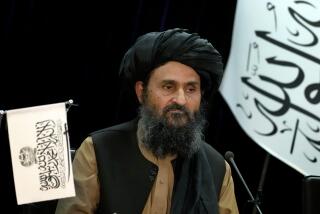Afghan leader puts off deadline for private security companies
- Share via
Reporting from Herat, Afghanistan — President Hamid Karzai agreed Wednesday to push back a deadline for the shutdown of private security contractors operating in Afghanistan, but the issue still looms as a potentially serious point of contention with donor governments.
The dispute, which began in August when Karzai abruptly announced a ban on all private firms providing security in the country, has spotlighted the increasingly fragile and tumultuous relationship between Karzai and his Western patrons.
Without private protection, major donors have said they would have no choice but to shut down development projects worth hundreds of millions of dollars. Many had already made contingency plans to do so if the Afghan government had held firm to a deadline of Dec. 17.
It took a series of high-level diplomatic meetings over the weekend and a call from Secretary of State Hillary Rodham Clinton to get Karzai to agree to delay by two months the implementation of his decree. In the meantime, a committee comprising Afghan and Western officials is to set up a timetable for ending the presence of the security firms.
Underscoring the sensitivity of the issue, Western embassies and the United Nations issued statements Wednesday that made a point of praising the Afghan government’s eventual goal of ridding the country of such private contractors. The firms have long been criticized for reckless behavior, with some operating as protection rackets and militias for hire.
Largely unmentioned, however, was the widely held view that the Afghan security forces are far from ready to take on the responsibility of safeguarding international aid efforts, as Karzai had proposed. Diplomats taking part in the talks also said the Afghan president had wanted the billions of dollars now allocated for private security contracts to be diverted directly to the coffers of his government.
Karzai’s plan to disband the security firms is popular among many Afghans as an expression of national sovereignty. Over the last year, he has made frequent public reference to foreign highhandedness.
Under the agreement, a review panel that includes Afghan officials, Western diplomats and representatives of NATO’s International Security Assistance Force will propose a timetable by Nov. 15 for ending the security firms’ work. After that, the affected companies will have up to 90 days to disband their operations in Afghanistan.
Karzai later said private security could be used on the premises of aid organizations and embassies, but not for guarding military convoys or development projects in the field.
The presidential palace said in a statement that the agreement took into account “the importance of maintaining the continuous delivery of critical development projects.”
More to Read
Sign up for Essential California
The most important California stories and recommendations in your inbox every morning.
You may occasionally receive promotional content from the Los Angeles Times.













